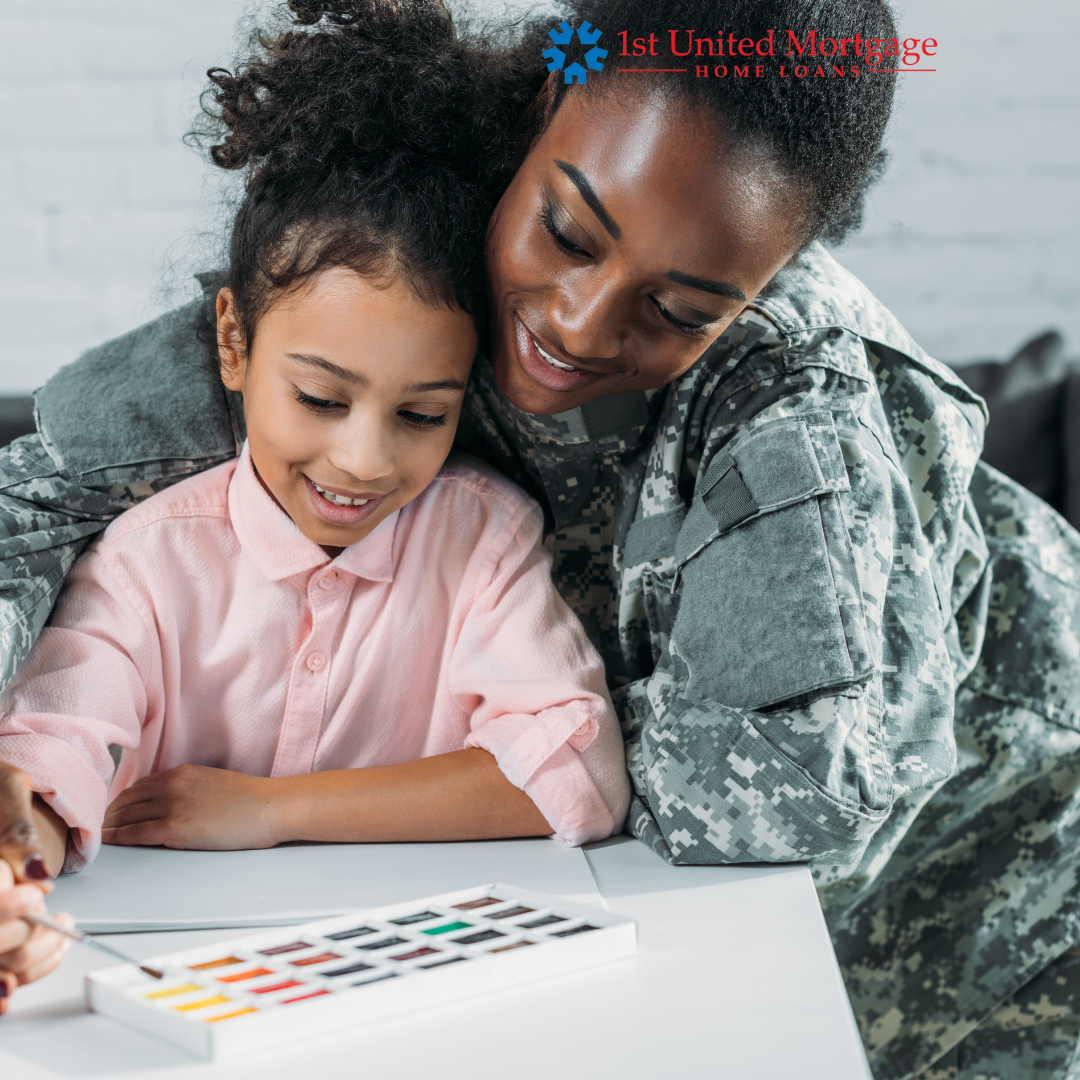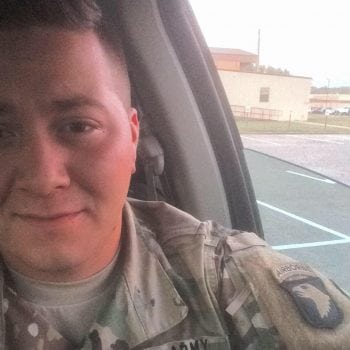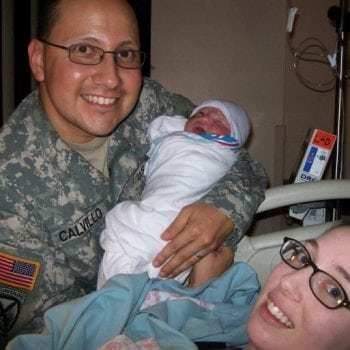Georgia VA Home Loans:
Eligibility, Getting Started and FAQs
For the 1st United Mortgage team, it’s our job and honor to help veterans, active military members, & their families with the American dream of buying a home.
We are proud to work with the VA Home Loan Program since that process has helped so many qualified applicants streamline the home buying experience.
In fact, thanks to the VA Home Loan Program, qualified home buyers can purchase a home with no down payment, low interest rates and even low credit scores. Our entire team is trained and ready to help clients understand eligibility, document requirements, and answering questions about Georgia’s state specific benefits.
As experienced VA home loan specialists, we work hard to keep your mortgage process stress-free and simple.
Many of our clients are thrilled to learn that a 620 credit score is not necessary for VA loan approval. At 1st United Mortgage, we approve loans with credit scores starting at 580!
If you do not yet qualify, we also have a credit score rehabilitation program that can help you get there.

VA Mortgage Options in Georgia

With multiple military bases in the state, all but the Coast Guard are represented there. Georgia is also very veteran-friendly. In fact, there are approximately 700,000 veterans living in the state, making it one of the most populated. The state offers a significant number of benefits for veterans so it’s no wonder many Georgia veterans take advantage of the VA Home Loan Program to purchase a home there.
The VA loan is only available as an earned benefit for military service. Click here to see if you qualify.
We also offer many other loan options for those not eligible for a VA loan, including FHA & other conventional loan options.
Military in Georgia
Georgia has several Army bases, two Navy Bases, two Air Force bases and one Air Force Reserve. The only branch not represented in the state is the Coast Guard. The state has mild winters and plenty of job opportunities for veterans, making it a great place to live for military retirees.
Here is a list of some the places we serve most often with VA loans in Georgia. Click the name to learn more about each one.
Atlanta
Atlanta is the largest city in Georgia. It boasts both a booming economy and thriving urban scene, plus a lot of surburban sprawl. Though there aren’t bases near the city, it draws many veterans seeking the hustle and bustle of city life.
Augusta
Augusta is the second largest city in Georgia. Fort Gordon is a few miles southwest and is one of the largest installations in the world. This military base is well loved for its location (just a few hours from Charleston and Myrtle Beach) and the variety of things to do nearby.
Columbus
Columbus is Georgia’s third largest city and a fantastic city for families and young professionals alike. Many service members from Fort Benning live here, as do a lot of veterans. The city is smaller than Atlanta, yet offers plenty to do, plus a strong community feel that most residents love.
Macon
Macon is a smaller town in Georgia that has been slowly reclaiming its beauty over the past few years. In fact, it’s been listed as the #1 place in the state to retire thanks to a low cost of living and high quality of life. With only a two hour drive to the mountains or a two hour drive to the beach, it’s no wonder veterans have started moving here!
Savannah
Savannah is a gorgeous city in Georgia with a rich history. With the largest army post east of the Mississippi River nearby (Fort Stewart), this coastal town is a popular choice for many active and retired military families.
Sandy Springs
Sandy Springs is a mid-size city in Georgia that is also considered one of the best places to live in the country. Residents love the cleanliness of the city, community feel and close drive to Atlanta.
South Fulton
Like Rosewell, South Fulton is a city just outside of Atlanta. The area is known for being safe, with excellent schools and a diverse community.
Warner Robins
Warner Robins is a smaller town just 18 miles away from Robins Air Force Base. The town is quickly growing thanks to a family friendly vibe and excellent school system.
Georgia VA Loan FAQs
Click the links below to quickly jump to a section:
Eligibility
Qualification
Costs
Guidelines
Basics
Refinancing
Eligibility
VA Loan Eligibility
- No private mortgage insurance or PMI
- Flexible credit and income requirements
- Consistently lower rates than other loan products
Your VA loan entitlement is a hard-earned benefit and we are here to help you utilize it. With unmatched buying power and flexibility, the VA loan program represents the simplest and most powerful path to homeownership for many veterans, service members and military families.
What is the VA Loan entitlement?
Am I eligible as a spouse of a deceased veteran?
Some non-military personnel, including both unmarried and remarried spouses are eligible for the VA home loan program. These include:
How can I get my Certificate of Eligibility?
The COE, or Certificate of Eligibility, is a formal VA document that certifies what entitlement, if any, a military member has for a VA home loan. The Certificate of Eligibility is a crucial for the process and is the way to verify a veteran’s eligibility and entitlement to the benefit. Prospective borrowers cannot complete the lending process without a COE. Veterans can contact the VA directly to obtain their Certificate of Eligibility, but it may take a few weeks to receive it. At 1st United Home Loans, we use an automated system to get your Certificate of Eligibility within moments.
Who is eligible for the VA Loan?
There are basic eligibility requirements for veterans and service members, along with members of the Reserves, the National Guard and surviving spouses.
If Any of the Following are True You May Be Eligible for a VA Loan :
• You served 181 days during peacetime (Active Duty)
• You served 90 days during war time (Active Duty)
• You served 6 years in the Reserves or National Guard
• You are the spouse of a service member who died in the line of duty or because of a service-connected disability.
Verification of a veteran’s eligibility for a VA loan is through a COE, or Certificate of Eligibility. These can be obtained directly from the VA, which typically takes a few weeks. Another option is to contact a lender, who can obtain your COE far more quickly. At 1st United Home Loans we cab get your Certificate of Eligibility in minutes.
It’s important to remember that not everyone eligible for a VA loan ultimately secures one. Borrowers will still need to satisfy credit and underwriting standards, which are set by both the lender and the VA.
When purchasing a home, does the VA Loan allow for cash back options?
What is the difference between eligibility and prequalification?
How do basic and bonus entitlements work?
How do I restore my entitlement once I pay off my previous VA Loan?
What is 2nd Tier Entitlement?
Can I use the VA Loan for a second home or rental properties?
VA Loan Qualification
Who sets the VA Loan guidelines, the VA or my lender?
There are broad requirements and guidelines for military borrowers as set by the VA. There are no income requirements or credit requirements; the VA simply requires that borrowers represent a satisfactory credit risk.
Still, it’s VA lenders who ultimately issue the loans. That means they have their own unique requirements, especially regarding credit scores. Prospective borrowers should understand they have to satisfy both guidelines – those set by the VA and the ones set by agency approved lenders.
If I have bad credit, can I still get a VA Loan?
Can someone else sign on the loan with me?
What income can I use to qualify for a VA Loan?
VA-approved lenders require prospective borrowers verify enough steady income to meet their monthly expenses (including a new mortgage payment). Lenders want a minimum of two years of stable employment, and proof that income comes from the same employer and job type. Sources of verification for income include:
• Base pay & allowances
• Non-military employment
• Retirement income
• Self-Employment
• Commissions
• Rental income
• A spouse’s income
• Alimony/child care
Overtime work, part-time jobs, second jobs and bonuses, must still show the same two-year period of stability. Self-employed veterans or those who make a living in the building trades, doing seasonal work or working mostly on commission have additional paperwork requirements. Tax returns for the previous two years will be essential in verifying income.
How long do I have to wait after bankruptcy to get a VA Loan?
Rate And Loan Costs
What fees should I expect to pay for my VA Loan?
What is the VA Funding Fee, and how do I calculate it?
How are rates for VA Loans determined?
Does my credit score affect my VA Loan rate?
VA Loan Guidelines
Can I borrow more than the value of my home with a VA loan?
Can I have more than one VA loan at a time?
How complicated is VA financing?
When purchasing a home, does the VA Loan allow for cash back options?
What is the maximum VA Home Loan?
Can I borrow extra money to make home improvements?
VA Loan Basics
How do I get prequalified and what happens afterward?
What if I don’t have copies of my discharge paperwork?
Can I pay off a VA Loan early?
When is the VA Loan not my best option?
VA Refinancing
Can the VA Loan help me lower my monthly bills?
What types of homes can I buy with a VA Loan?
The vast majority of military buyers use their VA loan to purchase or refinance an existing single-family home. But veterans interested in purchasing a condo or building a home from the ground up can also utilize a VA loan. You can use a VA loan:
- To purchase a residence that’s owned and occupied by the veteran.
- To refinance an existing VA-guaranteed or direct loan in order to lower the current interest rate.
- To refinance in order to take out cash.
- To repair, alter or improve a residence owned by a veteran.
- To simultaneously purchase and improve a home
- To make energy-efficiency improvements in conjunction with a VA purchase or refinance loan.
- To purchase up to four one-family residential units in a condo development approved by the VA. One of those four units must be used as the borrower’s primary residence.
- To purchase a farm residence to be owned and occupied by the veteran. The property cannot be a working farm or an income-producing property.
What Our Clients Are Saying
Zachary Burrows
Carmella Teeter
Anthony Calvillio
Ready To Start Today?
Get started immediately with our quick quote form or complete the full online application & get pre-qualified now.



